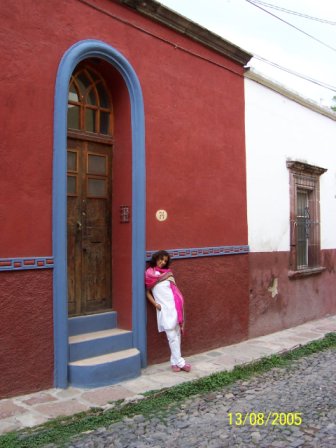In light of everything thats on the news these days, there is a growing discussion about why young Muslim men in England, who are often second or third generation immigrants, are turning to extreme versions of Islam. Today's Guardian raised the question of whether it is British multiculturalism that is to blame. As an Indian born in England myself, I've been trying to figure out whether British multiculturalism is really at fault here. Some thoughts are below....
Some background for my perspective. My family migrated to Britain in the 1960s. My mother and her sisters grew up in a suburb of London. They were one of very very few Indians in their school, and there were relatively few people of color in the neighbourhood. To be part of a larger community, they had to assimilate to British society. They had to speak English, they had to make English friends and they had to work for English bosses. They had to integrate in every way possible.
Today much has changed. The area they grew up in is predominantly an Indian area, and I suspect that the school has a majority of brown-skinned students. Most of the residents migrated in the 1970s and 1980s. All over London, there are many instances of Indian, Pakistani and Bangladeshis neighbourhoods. These are rather segregated places. If you go to Tower Hill for example (near the Tower of London), you can walk several miles and not have to speak in English or interact with anyone other than a Bangladeshi. As a result of the sheer number of people in these neighbourhoods, these immigrant populations can afford to cultivate rather narrow identities. Children who grow up here can have Bengali, Punjabi, Gujrati or Arabic as their mother-tongue. People who live here can choose to associate with people who are exactly like them. For example, in some of the Indian neighbourhoods, there are so many Indians that Gujratis can choose to associate primarily with Gujratis. Punjabis can choose to associate only with Punjabis. As a result, regional and often even caste identities are very strong. This often stands in stark contrast to the countries where the immigrants come from. In India for example, the pressures of modern-day urban living force people to be "Indian" first and Punjabi, Gujrati, Marathi, Tamilian, etc. second. Even caste or religious identities for that matter, tend to be subsumed into a greater "Indian" identity. In London however, my impression is that that people coming from parts of London where they are the dominant group are Punjabi first and anything else (British, I think) second.
It is my belief that when you combine the narrow identity of a rather segregated group with issues like unemployment, poverty (in some cases), lack of adequate economic opportunity, and parental pressures to achieve financial well-being, a lot of confusion and depression can result. To a young man growing up in a rather segregated neighbourhood, who doesn't perceive himself as having the economic opportunities to climb in British society, Islam can bring a lot of support, and a lot of comfort. The Muslim community can provide an important safety-net. A huge number of non-English-speaking clerics have migrated to London to meet the growing demand for religious education and instruction. Madrasas have grown in number, and opportunities to embrace strong forms of Islam now abound.
Unfortunately, the story doesn't end at that. A vicious cycle of some sort starts to kick in: the children growing up in the segregated neighbourhoods are not well-assimilated into broader British society and face fewer economic opportunities than their British counterparts. A young man reacts by embracing his narrow identity, and finding solace and support from his religious group. This reinforces difficult stereotypes and makes it harder for him to be assimilated. Anger grows. Frustration grows. The cycle intensifies. I believe this is what has happened in many neighbourhoods of London. Almost all the individuals who were arrested in connection with planning attacks were raised in neighbourhoods like these (including my mother's old neighbourhood)...
So I would say that it is not simply British multiculturalism that it is at fault. It is also the broader set of circumstances, attitudes, freedoms and opportunities that surround that multiculturalism, that make a big difference to the story. I believe that the creation of economic opportunities in immigrant neighbourhoods, and the provision of opportunities to develop a shared primary identity (through the educational system, for example) may go a long way in breaking the vicious cycle that the youth often find themselves in.....
Tuesday, August 15, 2006
Subscribe to:
Post Comments (Atom)

No comments:
Post a Comment